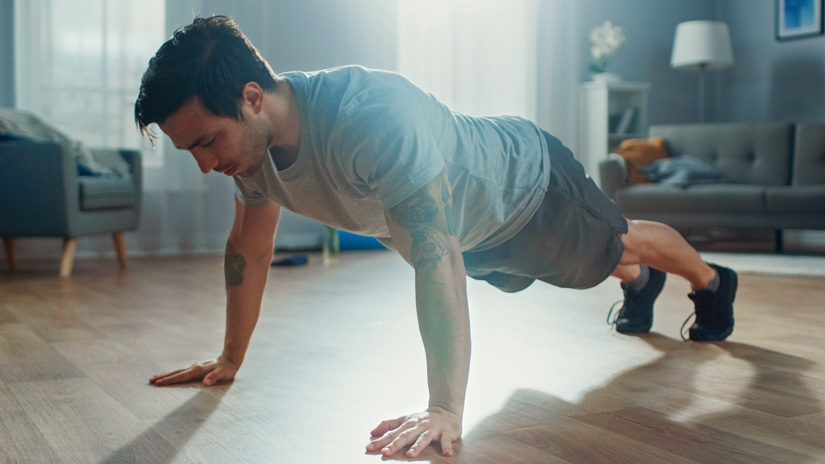Recent Changes
During this lengthy period when many of us have been staying home to slow the spread of COVID-19, our usual sources of exercise have been harder to come by. We’ve had to stay home from the gym. Our friendly pick-up games haven’t happened. Pools have been closed. Heck, many of us haven’t even been able to walk from the parking lot into work.
Folks with home gym equipment or who love to jog or bike have been able to keep their exercise routines in place. But for those who aren’t that fond of exercise anyway, it has probably been easy to let it slide for the time being.
But the sudden change in our social routine does not change the fact that exercise is good for us—both for our physical health and our mental health. And if you are a person in recovery, exercise can be an essential tool for maintaining your sobriety.
Even if you are stuck at home, it’s time to get yourself moving.
Let’s Set Some Goals
You know those infomercials that try to sell you fitness equipment? The ones that feature people who are already in ridiculously good shape? If you are like many people, you don’t find those commercials very inspiring. In fact, they can be downright depressing. If our current level of fitness is a long way from the folks we see on television, it is oh-so-easy to just conclude that we are simply too out of shape to even get started.
So let’s start with an important note: getting any amount of exercise is much better than getting none at all. Incremental changes are still changes—and they still have benefits for our health and as a strategy for protecting our sobriety.
Once you get going, you might keep a few baseline goals in mind. Getting in 30 minutes of physical activity a day (all at once or broken up into, say, two 15-minute sessions) is a great initial goal.
If you add a half an hour of moderate aerobic activity (exercise that gets your heart rate up) to your routine, you will actually exceed the Department of Health and Human Services (HHS) recommendations for weekly exercise. The HHS suggests 150 minutes of moderate aerobic exercise (or 75 minutes of vigorous aerobic exercise) each week. Thirty minutes of brisk walking each day, for example, gets the job done.
The HSS recommends strength training for all your major muscle groups at least twice weekly. This doesn’t mean you have to do 100 reps of any given exercise. Ideally, use enough resistance or weight that you find yourself getting tired after 12 or 15 repetitions of the exercise. Don’t know where to begin? The tried and true push-up might be a good starting place.
A reminder: You don’t have to hit these goals on day one. Try to enjoy the journey of working toward them, seeing improvement over time. And if you stick with your exercise, you will see that improvement.
Here’s Why Exercise Is Important
It is easier to set and stick to goals if you can remind yourself why you are working toward them in the first place. Exercise provides many benefits for everyone—and for people in recovery, in particular. Those benefits include:
- A boost to your mood, which is important for battling the depression and anxiety that can lead to relapse
- Increased energy levels, which can help you get through each day in a positive way
- More restful sleep, which is extremely important and offers many benefits
- Reduced feelings of boredom and fewer cravings related to inactivity
- A lessening of chronic pain, which can reduce reliance on painkillers that can be problematic for people in recovery
- A strengthening of the immune system, which is often damaged by misuse of drugs or alcohol
The Key Is Stick-to-itiveness
Ideally, you can find an activity (or set of activities) you really enjoy, making it easier to get going and keep going. Admittedly, that might be a challenge during this period when exercise options are limited. Still, you can employ the strategies below to increase your commitment level.
- Stick to a schedule and track your progress: Add exercise to your calendar just like you would any other important event. Record your accomplishments in the same way you might offer a progress report to your coworkers.
- Find a partner, but focus on your journey: A workout buddy (even if you can’t get together in person) can help you stay encouraged—and give you the opportunity to encourage someone else. Just remember that you and your partner are not in competition. Don’t compare your progress to anyone else’s.
- Provide rewards for success and grace for setbacks: Reward yourself when you accomplish a goal (just make sure that reward isn’t a threat to your sobriety). But give yourself some grace when you miss your targets. The important thing is to get started again so that you continue to experience the benefits of exercise.
We Are Ready to Help You Work Out Your Struggles with Drugs or Alcohol
At Bel Aire Recovery Center, we understand that taking the first step toward addressing your substance use disorder is often very difficult—in much the same way it can be hard to motivate yourself to exercise if you haven’t in a long time. But just as in the case of exercise, the benefits of treatment for a substance use disorder are undeniable. We offer expert, personalized, compassionate care designed to help you enter recovery with the resources and resolve you need to maintain it.




